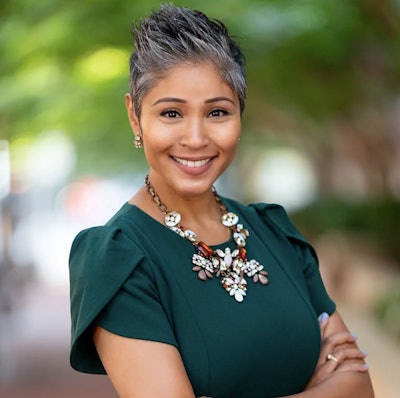On the second day of the virtual Campus Prevention Network Summit, hosted by EVERFI, conversations focused on diversity, equity and inclusion on campuses as well as the mental health of Black women students.
The COVID-19 pandemic has exposed the inequities in higher education, especially as most colleges moved online. Turns out, many low-income students lack access to high-speed internet, computers and other technological resources needed to attend online classes and complete course work online.
Jesse Bridges, senior vice president of diversity, equity and inclusion at EVERFI, said colleges should use this moment to look toward the future through an equitable lens, especially given some institutions plan to continue partially online even in the fall.
 Jesse Bridges
Jesse BridgesBridges also said colleges must put in place an inclusive excellence framework to “redesign the campus experience to be one that is safe, healthy and supportive of all students.”
She said the inclusive excellence framework was established as a way to help institutions “integrate their diversity and quality efforts, situate this work at the core of institutional functioning and realize the educational benefits available to students and to the institution when this integration is done well and is sustained over time.”
The four main areas of inclusive excellence, according to Bridges, are access and equality; curricular and co-curricular lens diversity; student learning; and development and climate.
“Creating forms of discussion and decision making where voices are genuinely heard, respected and novel ideas are taken into consideration” is important, she said. “Intentionality in the planning and design process is key.”
That means realizing that some students are more affected by the pandemic than others. For instance, low-income students are struggling to navigate college closings, unemployment and shelter-in-place restrictions.
“These issues, in addition to bias-related instances based on race, national origin, all influence who returns to campus and the support they will need in the campus community when they do,” said Bridges.
She said the need for culturally relevant mental health services and renewed support for high impact practices that can help underrepresented students rebound from the impact of the pandemic are ways that an intentional view on inclusion will influence the student experience.
 Dr. Colette Pierce Burnette
Dr. Colette Pierce BurnetteParticipants at the summit also discussed the mental health issues faced by Black women students at HBCUs.
The mental health challenges that affect Black women at higher rates are anxiety, trauma and substance abuse. Substance abuse becomes a way of self-medicating to deal with anxiety, trauma and depression, according to Dr. Raé Lundy, associate vice president of student health, counseling and wellness at Wiley College.
“Women are often suffering in silence because of this need that Black women at times have to be superwomen,” she added. “There’s this superwomen complex where we have to put on the mask and we have to have a brave face and carry everybody else’s issues and those things are causing Black women, in particular, to experience distress.”
Dr. Colette Pierce Burnette, president and CEO of Huston-Tillotson University, emphasized the idea that vulnerability is okay. She has an open-door policy and a box of tissues on her desk for any student coming in to share their story. The campus also has a full-time counselor available for students.
“This may seem small, but we’ve really invested dollars into really creating a space that is comfortable for students even if they don’t want to be seen,” she said. “But they just want to go there and have a space.”
While in-person counseling has been affected by the COVID-19 pandemic, many colleges have continued the work virtually.
“Although not in-person, I’ve had some extremely meaningful counseling sessions with students via telehealth,” said Lundy. “My students have been so honestly excited that we haven’t ‘forgotten them.’ When we transitioned, I think there was this fear that somehow we were just going to leave them and drop them.”
Dr. Nadrea Njoku, senior research associate in the Frederick D. Patterson Research Institute at the United Negro College Fund, said that although there have been a lot of changes during the pandemic, “the work doesn’t stop.”
“It’s a moment to source a sense of creativity for how we might do this work,” she added. “Particularly as we serve Black women and students at HBCUs. How can we be most creative but also how can we take care of ourselves.”
Sarah Wood can be reached at [email protected].


















